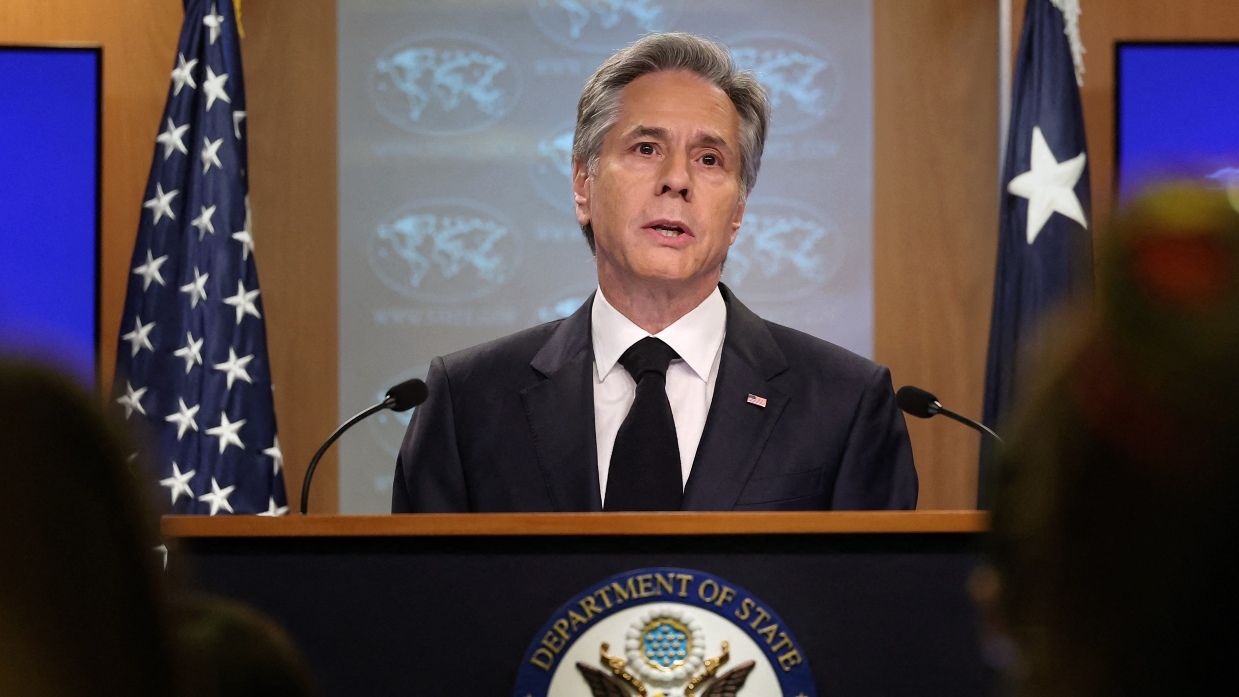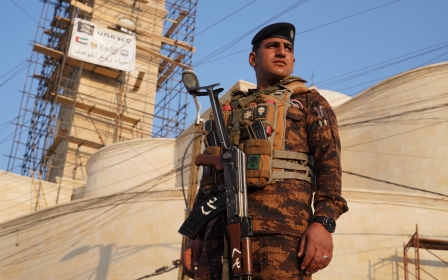Biden administration's human rights report buries Shireen Abu Akleh killing

The US State Department's annual human rights report has deferred to the Israeli government's version of events on the killing of Palestinian-American journalist Shireen Abu Akleh, and did not mention the death of a US citizen who died after being arrested by Israeli forces last year.
The report, released on Monday, did not label the journalist's death as an extrajudicial or arbitrary killing, only noting it under its section on freedom of expression.
Last May, Israeli forces shot and killed Abu Akleh during an Israeli raid on the city of Jenin in the occupied West Bank. Her death sparked Palestinian outrage and widespread international condemnation.
An Israeli army investigation into Abu Akleh's killing concluded that she was likely shot by an Israeli soldier but was not deliberately targeted. But several independent investigations found that Abu Akleh and her colleagues were explicitly targeted despite being identifiable as members of the press.
The State Department's report also does not mention the death of 80-year-old Palestinian American Omar Asaad, who died after being placed in Israeli custody. The New York Times reported he suffered a stress-induced heart attack that was most likely caused by being gagged at a cold construction site, citing a coroner's report.
While the killing of Abu Akleh was not placed under its section on extrajudicial killings, the State Department's report took aim at Israel's investigations into its security forces and cases of abuse, unlawful and arbitrary killings, and restrictions against Palestinians.
"The Israeli military and civilian justice systems have rarely found members of the security forces to have committed abuses," the State Department report says.
"There were several reports that the government or its agents committed arbitrary or unlawful killings," the report added, noting that "citizens with mental disabilities were at greater risk of being subjected to violence when interacting with police".
'Double standards'
In announcing the report during a press conference on Monday, Secretary of State Antony Blinken said: "We’re not pulling our punches with anyone as – we call things as we see them."
Still, despite the report, the US has continued to provide diplomatic and military support for Israel, which Palestinian rights advocates say is fuelling violence and rights violations against Palestinians.
'The annual human rights report demonstrates that the Biden Administration continues a policy of double standards'
- Paul O'Brien, Amnesty International USA
Earlier this month, after Israeli Finance Minister Bezalel Smotrich called for the Palestinian town of Huwwara to be "wiped out", the US issued him a visa despite calls from progressive groups, rights organisations, and Jewish groups for Smotrich to be denied entry into the country.
Rights groups have, for years, criticised the Biden administration for not keeping up with its promise to put human rights at the centre of its foreign policy.
"When Secretary of State Blinken announced the US foreign policy strategy, he said it would be one centered in human rights," Paul O'Brien, executive director of Amnesty International USA, said in a statement on Monday.
"Yet the annual human rights report demonstrates that the Biden Administration continues a policy of double standards when it comes to failing to call out the human rights abuses of key security partners."
O'Brien said that the Biden administration's report "fails to fully encompass the deteriorating human rights situation" in the Israeli-occupied West Bank and "gives de facto recognition of Israeli control over occupied East Jerusalem and the Golan Heights".
"It’s time the Biden administration stops giving its allies a pass on human rights."
US Gulf allies
The annual report cited a number of human rights abuses committed by its Middle Eastern allies, including Saudi Arabia and the United Arab Emirates.
The State Department lists a long range of rights abuses in Saudi Arabia, including extrajudicial killings, enforced disappearances, arbitrary arrests, and life-threatening prison conditions.
The report comes as Saudi Arabia has released from prison the 72-year-old US citizen, Ibrahim Almadi, who was sentenced to 19 years over tweets he posted criticising the kingdom. Almadi remains under a travel ban and cannot leave the country.
Monday's report comes a week after US Senators Chris Murphy and Mike Lee introduced a measure that would require the State Department to submit a report on the human rights situation in Saudi Arabia, otherwise, all security assistance to the kingdom would halt.
“US weapons don't belong in the hands of human rights abusers,” Lee said in a statement. “The [American] people and their elected representatives have a right to know the types of activity we are tacitly supporting.”
Despite the Biden administration calling for a re-evaluation of the US-Saudi relationship, human rights experts say Biden has yet to come up with a new approach to its partnership with the kingdom. The US president said when coming into office that he would only deal with King Salman, but in Monday's report, it labels Saudi Crown Prince Mohammed bin Salman as "head of state".
According to the legal charity Reprieve and the European Saudi Organisation for Human Rights, the use of the death penalty in Saudi Arabia has almost doubled since the rise to power of Crown Prince Mohammed bin Salman in 2015.
From 2010-2014, there was an average of 70.8 executions per year carried out in the kingdom. Then, from 2015 - the year the crown prince became the de facto ruler of the kingdom - until 2022, there was an average of 129.5 executions per year, a rise of 82 percent.
The United Arab Emirates, another ally of the US, was mentioned in the report for a range of abuses as well, from incommunicado detention to restrictions on media and expression, as well as "serious and unreasonable restrictions on political participation". The report also listed rights abuses in other Middle East countries, including Egypt, Tunisia, and Jordan.
This article is available in French on Middle East Eye French edition.
Middle East Eye delivers independent and unrivalled coverage and analysis of the Middle East, North Africa and beyond. To learn more about republishing this content and the associated fees, please fill out this form. More about MEE can be found here.






